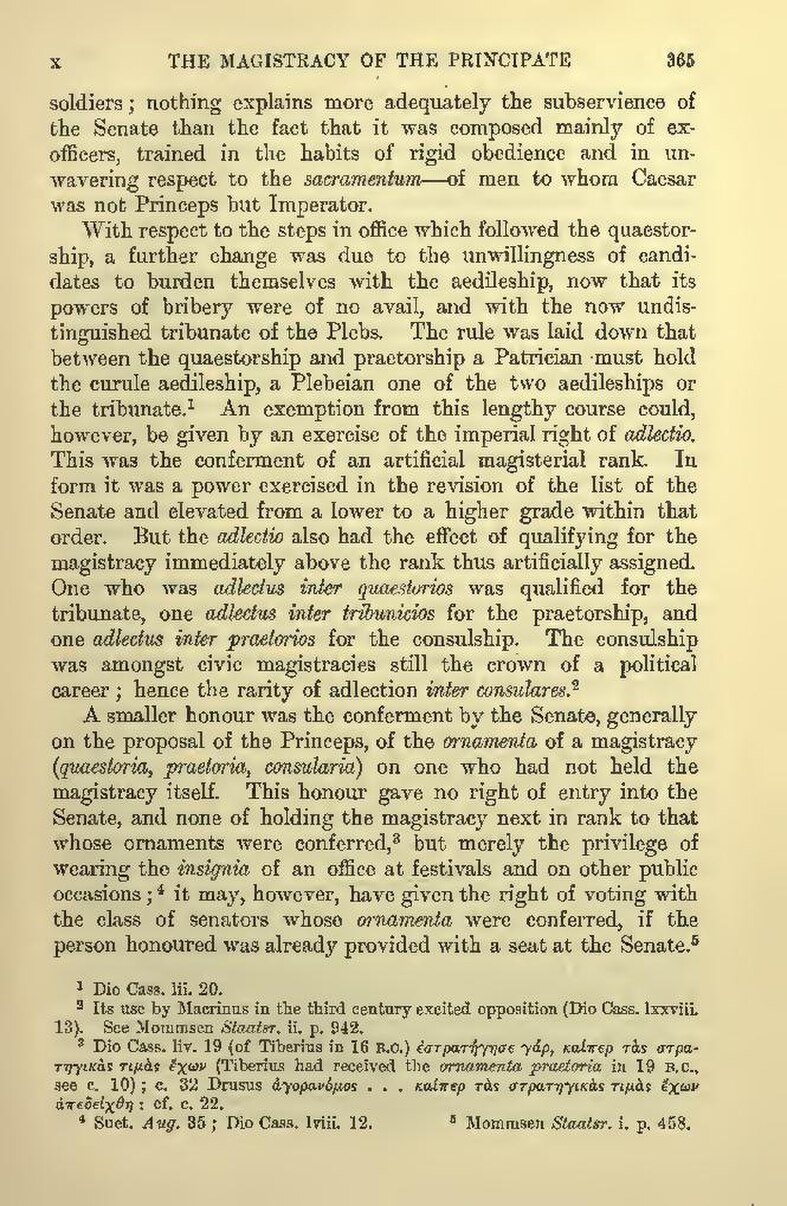soldiers; nothing explains more adequately the subservience of the Senate than the fact that it was composed mainly of ex-officers, trained in the habits of rigid obedience and in unwavering respect to the sacramentum—of men to whom Caesar was not Princeps but Imperator.
With respect to the steps in office which followed the quaestorship, a further change was due to the unwillingness of candidates to burden themselves with the aedileship, now that its powers of bribery were of no avail, and with the now undistinguished tribunate of the Plebs. The rule was laid down that between the quaestorship and praetorship a Patrician must hold the curule aedileship, a Plebeian one of the two aedileships or the tribunate.[1] An exemption from this lengthy course could, however, be given by an exercise of the imperial right of adlectio. This was the conferment of an artificial magisterial rank. In form it was a power exercised in the revision of the list of the Senate and elevated from a lower to a higher grade within that order. But the adlectio also had the effect of qualifying for the magistracy immediately above the rank thus artificially assigned. One who was adlectus inter quaestorios was qualified for the tribunate, one adlectus inter tribunicios for the praetorship, and one adlectus inter praetorios for the consulship. The consulship was amongst civic magistracies still the crown of a political career; hence the rarity of adlection inter consulares.[2]
A smaller honour was the conferment by the Senate, generally on the proposal of the Princeps, of the ornamenta of a magistracy (quaestoria, praetoria, consularia) on one who had not held the magistracy itself. This honour gave no right of entry into the Senate, and none of holding the magistracy next in rank to that whose ornaments were conferred,[3] but merely the privilege of wearing the insignia of an office at festivals and on other public occasions;[4] it may, however, have given the right of voting with the class of senators whose ornamenta were conferred, if the person honoured was already provided with a seat at the Senate.[5](Tiberius had received the ornamenta praetoria in 19 B.C., see c. 10); c. 32 Drusus [Greek: agoranomos . . . kaiper tas stratêgikas timas echôn apedeichthê]: cf. c. 22.]
- ↑ Dio Cass. lii. 20.
- ↑ Its use by Macrinus in the third century excited opposition (Dio Cass. lxxviii. 13). See Mommsen Staatsr. ii. p. 942.
- ↑ Dio Cass. liv. 19 (of Tiberius in 16 B.C.) [Greek: estratêgêse gar, kaiper tas stratêgikas timas echôn
- ↑ Suet. Aug. 35; Dio Cass. lviii. 12.
- ↑ Mommsen Staatsr. i. p. 458.
